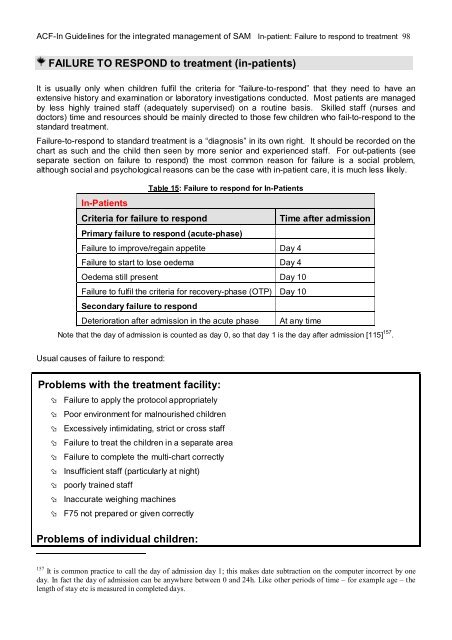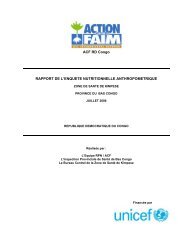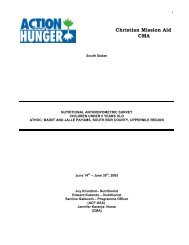guidelines for the integrated management of severe acute malnutrition
guidelines for the integrated management of severe acute malnutrition
guidelines for the integrated management of severe acute malnutrition
Create successful ePaper yourself
Turn your PDF publications into a flip-book with our unique Google optimized e-Paper software.
ACF-In Guidelines <strong>for</strong> <strong>the</strong> <strong>integrated</strong> <strong>management</strong> <strong>of</strong> SAM In-patient: Failure to respond to treatment 98<br />
FAILURE TO RESPOND to treatment (in-patients)<br />
It is usually only when children fulfil <strong>the</strong> criteria <strong>for</strong> “failure-to-respond” that <strong>the</strong>y need to have an<br />
extensive history and examination or laboratory investigations conducted. Most patients are managed<br />
by less highly trained staff (adequately supervised) on a routine basis. Skilled staff (nurses and<br />
doctors) time and resources should be mainly directed to those few children who fail-to-respond to <strong>the</strong><br />
standard treatment.<br />
Failure-to-respond to standard treatment is a “diagnosis” in its own right. It should be recorded on <strong>the</strong><br />
chart as such and <strong>the</strong> child <strong>the</strong>n seen by more senior and experienced staff. For out-patients (see<br />
separate section on failure to respond) <strong>the</strong> most common reason <strong>for</strong> failure is a social problem,<br />
although social and psychological reasons can be <strong>the</strong> case with in-patient care, it is much less likely.<br />
In-Patients<br />
Table 15: Failure to respond <strong>for</strong> In-Patients<br />
Criteria <strong>for</strong> failure to respond Time after admission<br />
Primary failure to respond (<strong>acute</strong>-phase)<br />
Failure to improve/regain appetite Day 4<br />
Failure to start to lose oedema Day 4<br />
Oedema still present Day 10<br />
Failure to fulfil <strong>the</strong> criteria <strong>for</strong> recovery-phase (OTP) Day 10<br />
Secondary failure to respond<br />
Deterioration after admission in <strong>the</strong> <strong>acute</strong> phase At any time<br />
Note that <strong>the</strong> day <strong>of</strong> admission is counted as day 0, so that day 1 is <strong>the</strong> day after admission [115] 157 .<br />
Usual causes <strong>of</strong> failure to respond:<br />
Problems with <strong>the</strong> treatment facility:<br />
� Failure to apply <strong>the</strong> protocol appropriately<br />
� Poor environment <strong>for</strong> malnourished children<br />
� Excessively intimidating, strict or cross staff<br />
� Failure to treat <strong>the</strong> children in a separate area<br />
� Failure to complete <strong>the</strong> multi-chart correctly<br />
� Insufficient staff (particularly at night)<br />
� poorly trained staff<br />
� Inaccurate weighing machines<br />
� F75 not prepared or given correctly<br />
Problems <strong>of</strong> individual children:<br />
157 It is common practice to call <strong>the</strong> day <strong>of</strong> admission day 1; this makes date subtraction on <strong>the</strong> computer incorrect by one<br />
day. In fact <strong>the</strong> day <strong>of</strong> admission can be anywhere between 0 and 24h. Like o<strong>the</strong>r periods <strong>of</strong> time – <strong>for</strong> example age – <strong>the</strong><br />
length <strong>of</strong> stay etc is measured in completed days.

















